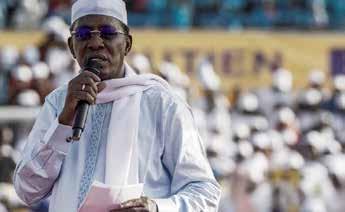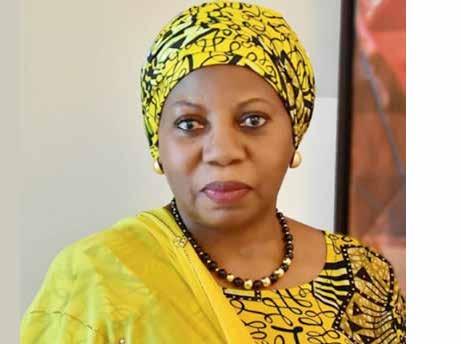
15 minute read
Book Review: The Other Side of Fear
The Other Side of Fear
Uncertainty, anxiety and fear: only fictitious superheroes are exempted from this all-too human sequence. The trouble is that fear is paralyzing because it feeds our minds with negative thoughts. In a second, fear can turn the idea of courage into one of recklessness, and then it’s all downhill to a point where determination is put aside in favour of ‘playing it safe.’ Sadly, fear can stop you from doing anything slightly risky. It’ll keep you locked up in the prison of the comfortable and predictable where you’re more likely to die of boredom than might from any of the dangers you fear. So, what’s to be done? The simple answer is that risk-taking and adaptability are as much part of our human heritage as uncertainty-inspired fear. It’s finding a balance that matters most. Fear is a useful tool for making better life-directing decisions, but fear must never be allowed to control the direction of your life. That way you lose the opportunity of reaching your true potential. I hope this book will inspire you to transcend your fears and achieve all of your dreams. The greatest prison you can live in is the prison of your own fears. Nothing of value can be achieved when we allow fear to control our life. Grab a copy of “The other side of fear” be inspired to live above your fears. You can purchase E-book & paperback on amazon. First and foremost, I want to thank God for guiding my every step towards completing this project and to every other person who contributed to this. I’ve learned that if we can find the courage to begin something, God will empower & enable us to complete the task. There’s nothing we cannot accomplish if we are determined enough. I was inspired to write this book because fear has kept a lot of people locked up in the prison of comfort. Too many people are living in a self-made prison of their own fears, they are stuck, unable to move forward and achieve their meaningful dreams. Fear has the power to limit your greatness, and blind you from seeing the opportunities that lies ahead of you. Everything you desire is on the other side of your fear, don’t stay trapped behind the walls of your fear for the rest of your life. It’s time to move towards your fears instead for trying to avoid them. I can confidently tell you that this book will inspire and challenge you to transcend your fears. And also provide principles to help you on the journey.
Advertisement
Grab a copy of this book to bless yourself, a friend or a loved one. You can read online, download, & order hard copies of this book online click on the link. www.amazon.com/Other-Side-Fear-M-K-Slim-ebook/dp/
B088RKSDW7/ref=sr_1_8?
Thank you
By M.K. Slim

About M.K. Slim
For much of my life, I’ve been fully committed to my music career, but I’m also an entrepreneur and a budding writer. I’m very motivated and mentally resilient: a genuinely optimistic person who believes that anything can be achieved if I’m determined enough. I strive to create a positive impact in the lives of those around me and I believe the highest of human acts is to inspire others to reach their potential. I strive to inspire as many people as I can. I’d like others to say of me, “Because you didn’t give up, I can do the same.” That’s the legacy I hope to leave behind when I die.


Victory Outreach Church Almere is a Pentecostal Church, a Bible based believing people in the trinity of Jesus Christ as Lord and Savior. What would you like to know? Our vision? Which activities we organize? Or would you like to hear testimonies about how we follow God? One thing is certain, we would like to get to know you and therefore you are more than welcome to visit one of our services in this new year 2020. You can visit us every day of the week as there is a Resident Pastor available to your demand. You may have been a believer for many years already. Or you might still be searching for the meaning of life and asking yourself whether or not there is God. Within Victory Outreach Almere we would like to help you find the answer. We will gladly teach you through the help of the Holy Spirit the exact meaning of “a living faith”. With us you will truly see and experience the supernatural power of the living God. You can always count on love and comfort when you need it. You will discover that we have a wonderful diversity of people with lots of different backgrounds, characters and personalities. But there is one thing we have in common. We all follow the same God, Jesus Christ. In that diversity and love for God, we are a family where you are more than welcome. We personally hope to meet you during one of our services. God bless you as you come in Jesus Christ name. Amen Signed: Pastor Roel & Ida van Rooij Senior Pastors Victory Outreach Almere. Barbeelstraat 12, 1317 PZ Almere The Netherlands. Telephone: +31646890203; Telephone: 036-7505571
E-mail: info@voalmere.nl
Website: www.voalmere.nl
Join our church service every SUNDAY in church and also online service via FACEBOOK or YOUTUBE Victory Outreach Almere

New book: Amílcar Cabral: The Life of a Reluctant Nationalist is out
On 20 January 1973, the BissauGuinean revolutionary Amílcar Cabral was killed by militants from his own party. Not many people outside his country know what really happened and the whole story has been documented for us to know the life of this quite revolutionary leader in his own right. Despite Cabral’s assassination, Portuguese Guinea became the independent Republic of Guinea-Bissau. The guerrilla war that Cabral had started and led precipitated a chain of events that would lead to the 1974 Carnation Revolution in Lisbon, toppling the fortyyear-old authoritarian regime. This paved the way for the rest of Portugal’s African colonies to achieve independence.
The book is written by a native of Angola, Antonio Tomas, “Amílcar Cabral: The Life of a Reluctant Nationalist” narrates Cabral’s revolutionary trajectory, from his early life in Portuguese Guinea to his death at the hands of his own men. Using recently opened state security police archives, the book details his quest for national sovereignty, beleaguered by the ethnic-based identity conflicts the national liberation movement struggled to overcome. Through the life of Cabral, António Tomás critically reflects on existing ways of thinking and writing about the independence of Lusophone Africa.
António Tomás is an Associate Professor in the Graduate School of Architecture at the University of Johannesburg. He holds a PhD in Anthropology from Columbia University, in New York. He has worked as a journalist in Angola and Portugal and has written extensively on issues related to Lusophone Africa. For more details on how to get this book, kindly send an email to: raminta@hurstpub.co.uk Pages: 272pp Price: £30 ISBN: 9781787381445
By Raminta Uselyte Publicity Assistant

AS FRENCH DOMINOES FALL – IDRISS DEBY
Dear Editor, Last year, Chadian President Idriss Deby Itno named himself Field Marshall. Unlike the one in Lebialem, he did not seek publicity for his new rank. After all he had been Commander of the Chadian army under Hisene Abri before the coup d’etat of 1990 that brought him to power. He was to remain in power for 30 years. A couple of days ago it was announced that he had won the last presidential elections by 79% of the votes. He could only take part in this election by implementing the political curse of almost all African presidents especially in French-speaking Africa - a constitutional amendment of the term limits which will permit him to run for office until 2033. To add insult to injury, his son Mahamat Kaka has been appointed by a transitional council to be interim president. Chadian constitution states clearly that the President of the Parliament should take over as interim President. This, therefore, makes it a coup d’etat. Of course, if the president of Chad’s parliament is a doddering senile old man who increasingly finds it difficult just to read simple French text prepared for him like we have been blessed with Cayaye or who cannot even get out of his own car without help like our own Njipenji of the senate, it makes a lot of sense. Idriss Deby presided over a very unstable country. The last couple of years his own cousin was being financed from the Gulf states to rebel against him.

The opposition boycotted the elections and the president and his family are accused of mismanaging the country’s oil wealth. As hundreds of thousands of Chadians now hurry to cross the bridge as refugees into Cameroon, we might all want to pause and reflect on all this. By Jude Mortimer Kelha Amsterdam, The Netherlands
Dr. Hajo Sani leaves for UNESCO

By Aliyu Abdullahi Special Assistant to the President (Media and Publicity) Office of the First Lady of Nigeria The Office of the First Lady of Nigeria has received with joy the news of the appointment of the Senior Special Assistant to the President on Women Affairs and Administration, Dr. Hajo Sani as Ambassador and Permanent Representative of Nigeria to UNESCO. Dr. Hajo Sani has in the last six years served as the head of Administration to the office of the First Lady of Nigeria, bringing her experience in government and development circles as a humanitarian, gender, health, and education advocate, as well as a teacher, administrator, and politician to bear in the smooth operation of the Office. The Office of the First Lady, despite the loss of her valuable services, congratulates Dr. Hajo Sani on this notable appointment and commends the Federal government, under the leadership of President Muhammadu Buhari for identifying her competence and the invaluable contributions she will make to Nigeria and the world during her tour of duty.
‘We cannot drink oil’: campaigners condemn East African pipeline project
Activists say the ‘heart of Africa’ line shipping crude from Uganda to Tanzania is unnecessary and poses a huge environmental risk. These Activists have accused French and Chinese oil firms of ignoring huge environmental risks after the signing of accords on the controversial construction of a £2.5bn oil pipeline by the President of both countries of Uganda and Tanzania.
Uganda, Tanzania and the oil companies Total and CNOOC signed three key agreements last month that pave the way for construction to start on the planned east African crude oil pipeline (EACOP). But late last month, a letter signed by 38 society organizations across both east African countries said the parties had failed to address environmental concerns over the pipeline and had steamrollered over court and parliamentary processes. Work is expected to begin this year on what would be the world’s longest electrically heated pipeline, which will move crude oil from fields near Lake Albert in western Uganda 900 miles to Tanzania’s Indian Ocean seaport of Tanga. Uganda’s crude oil is highly viscous, so it must be heated to be kept liquid enough to flow. Uganda’s President, Yoweri Museveni, and his Tanzanian counterpart, President Samia Suluhu Hassan, witnessed the signing of agreements between shareholders, host governments, and on tariff and transport between EACOP and the Lake Albert oil shippers. Uganda discovered reserves of crude near Lake Albert on its border with the Democratic Republic of the Congo (DRC) in 2006, and the landlocked country wants a pipeline to transport oil to international markets. “These agreements open the way for the commencement of the Lake Albert development project,” Total said in a statement. “The main engineering, procurement and construction contracts will be awarded shortly, and construction will start. First oil export is planned in early 2025.” The oil will come from two projects – the Tilenga project, operated by Total, and the Kingfisher project, operated by CNOOC, which together are expected to produce up to 230,000 barrels a day. Government geologists estimate total reserves at 6bn barrels. However, Diana Nabiruma, of the Africa Institute for Energy Governance (AFIEGO), told the press: “It is concerning that major agreements are being signed and the companies are being given the go-ahead to award contracts and start developing the Lake Albert oil project. “The oil projects pose major environmental risks. Resources, some shared with countries such as the DRC, Tanzania and Kenya, including Lake Albert as well as Lake Victoria and rivers, are at risk of oil pollution,” she said. “The resources support the fisheries, tourism and other economic activities. They are also important for food and water security. They therefore must be conserved.” The #StopEACOP alliance campaign condemned the decision to build the pipeline, which it says will displace 12,000 families and would be a huge environmental risk at a time of climate emergency, when the world needs to move away from fossil fuels. Vanessa Nakate, founder of the Rise Up climate movement in Uganda, said: “There is no reason for Total to engage in oil exploration and the construction of the east Africa crude oil pipeline because this means fuelling the destruction of the planet and worsening the already existing climate disasters in the most affected areas. “There is no future in the fossil fuel industry and we cannot drink oil. We demand Total to rise up for the people and the planet,” she said. Lucie Pinson, of Reclaim Finance, which works to decarbonise the financial system, added: “We call on banks

to publicly commit to stay clear of the project and investors to vote against Total’s climate strategy and the renewal of the mandate of its CEO Patrick Pouyanné at the group’s AGM in May.” Last month, more than 260 African and international organisations sent an open letter to 25 commercial banks urging them not to finance the construction of the EACOP. David Pred, of Inclusive Development International, which supports communities to defend their rights against harmful corporate projects, said: “The oil companies are trying to dress up the investment decision signing ceremony, but fortunately this climate-destroying project is far from a done deal. “Total and CNOOC still need to secure insurance and raise $2.5bn in debt financing for the EACOP to move forward and they are going to struggle mightily to find enough banks and insurance providers willing to associate themselves with such a project,” he claimed. Total said it had undertaken “rigorous” environmental and social risk assessment and mitigation strategies in relation to the projects. In its statement, it said: “All the partners are committed to implement these projects in an exemplary manner and taking into highest consideration the biodiversity and environmental stakes as well as the local communities’ rights and within the stringent environmental and social performance standards of the International Finance Corporation.” Pouyanné said: “The Tilenga development and EACOP pipeline project are major projects for Total and are consistent with our strategy to focus on low break-even oil projects while lowering the average carbon intensity of the group’s upstream portfolio. These projects will create significant in-country value for both Uganda and Tanzania. “Total is also taking into the highest consideration the sensitive environmental context and social stakes of these onshore projects. Our commitment is to implement these projects in an exemplary and fully transparent manner.” CNOOC has been approached for comment. But Nabiruma accused the two east African governments of racing to sign deals before their citizens had been told how any risks would be “avoided, minimised or mitigated”. Robert Kasande, permanent secretary at Uganda’s ministry of energy and mineral development, said: “We are very mindful of the environment that we work in. It’s a very sensitive ecosystem. So we have put everything that we need to do in place.” He said the project was being conducted in accordance with the Equator principles – a risk-management framework adopted by financial institutions for assessing and managing environmental and social risk in projects. “This is a big project for us as a country,” Kasande said. “These resources that are going to be coming into the country are going to be a huge boost to this economy.”
Tanzania has completed payment for three new planes, says Prime Minister
The government of Tanzania last month has revealed that has completed payments for the purchase of three new planes to add to already nine acquired for the former and late President John Magufuli. This information was disclosed by the Prime Minister Kassim Majaliwa while addressing the Parliament on the estimates and expenditure of the Office of the Prime Minister and its institutions for the financial year 2021/2022. Majaliwa said the aero planes are expected to arrive in the 2021/22 financial year therefore bringing the number of government owned fleet to 12. Prime Minister Majaliwa also commended national carrier Air Tanzania for launching foreign trips to Guangzhou China, saying the trips are a catalyst for boosting trade, tourism and employment. The statement comes a few days after a report by the Auditor General and Controller of Public Accounts in Tanzania, Charles Kichere, outlined the challenges facing the airline. According to the CAG said ATCL has incurred a cumulative loss of about Sh150 billion over the past five years. According to the CAG, for the past one year, ATCL has incurred a loss of Sh60 billion. The planes are expected to be leased to Air Tanzania just like the other previous nine planes with arrangement of gradual payment of the lease agreement.











